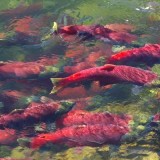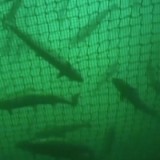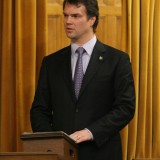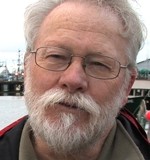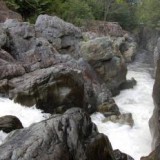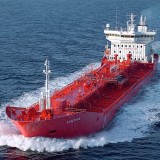It’s wondrous to behold! So many have seen religion at the same time!
Vaughn Palmer of the Postmedia Sun has finally got religion and is openly questioning the Liberal government’s position on the use of Telus resources to help build the new roof on BC Place Stadium! One looks in vain to see any criticism of consequence over the deal to build the roof in the first place so that the jock world had a better playpen at taxpayers’ expense.
Where, oh where, has there been any coverage in Vaughn’s columns over the years on fish farms, private power development, Enbridge’s pipeline project and tanker traffic down our coast and increased tanker traffic through Vancouver Harbour?
Mike Smyth of the Postmedia Province has got religion at long last and is highly critical of the Clark government’s refusal of the $35 million Telus offered to have the jocks’ publicly financed sand box named for them.
Where, oh where, has there been any coverage in Mike’s columns over the years of fish farms, private power development, Enbridge’s pipeline project and tanker traffic down our coast and increased tanker traffic through Vancouver Harbour?
There’s a guy named Fletcher, I think, who works, I believe, for the David Black newspapers, who manages to kiss the establishment’s backside while anointing its feet – a daunting task which he has easily managed. I somehow doubt that he’ll see the light – although he did come out against the Enbridge pipeline not too long ago.
Tom Siddon, formerly Federal Fisheries Minister, has seen religion and is critical of his old party for removing “habitat” from the Fisheries Act. Here’s the story from the Edmonton Journal.
Siddon said the wording would turn fish into a commodity and overlook the importance of the broader ecosystem that, for instance, allows British Columbia’s famous salmon resource to thrive.
“It’s like saying as long as we have a happy lifestyle and can go to the rec centre and keep fit, it doesn’t matter what the air is like that we breath or the water that we drink,” Siddon said.
“If we want to preserve and protect our fish stocks, it’s more than a commercial equation.”
Wasn’t Siddon the federal Fisheries Minister when a so-called compromise was brokered between the senior governments and Alcan which agreed to lower the Nechako River – which Alcan’s Kemano II project would do despite a Department of Fisheries study condemning the project in no uncertain terms? A report of 1985 which didn’t see the light of day until it was leaked to me at the height of the battle in the 1990’s?
Here’s what I said during the fight against this hideous project. Scientists were giving evidence that the proposals were catastrophic to salmon runs. The deal was struck in the absence of all seven DFO scientists who had worked on the project and the commission was, in effect, given Alcan’s figures to work with. The chairman of the Settlement Group, Dr. David Strangway, wouldn’t know a sockeye salmon from a sea cucumber.
I strongly support what Mr. Siddon said last week and hope his former mates take him seriously. I say – in all seriousness – that we all should be like Mr. Siddon and ponder on positions we took in earlier times. As Emerson put it, a foolish consistency is the hobgoblin of little minds.
As environmentalists, the Common Sense Canadian welcomes Mr. Siddon’s support. With his long government experience and his position as Fisheries Minister his words carry considerable weight.
When one looks at the entire picture of the Harper government in the environment, a thought occurs. That bunch are for fish farms, private river projects, pipelines carrying toxic gunk over 1,100kms of our pristine wilderness, huge tankers down our extremely dangerous coast, all without much meaningful public input.
It seems clear that our MPs join the Prime Minister in giving British Columbians the finger, leaving civil disobedience the only option left for thousands of British Columbians who condemn Harper’s wanton abandonment of our heritage.
May I respectfully suggest that you post on the fridge this list of 21 Conservative toadies who have abandoned their province to the Harper whip:
Ed Fast Abbotsford ed@edfast.ca
Dick Harris – Cariboo – Prince George Harris.R@parl.gc.ca
Mark Strahl – Chilliwack – Fraser Canyon mark.strahl@parl.gc.ca
Kerry Lynne Findlay – Delta – Richmond East MP Kerry-Lynne.Findlay@parl.gc.ca
Nina Grewal – Fleetwood – Port Kells Grewal.N@parl.gc.ca
Cathy McLeod – Kamloops – Thompson – Cariboo McLeod.C@parl.gc.ca
Ron Cannan – Kelowna – Lake Country ron.cannan@parl.gc.ca
David Wilks – Kootenay – Columbia David.wilks@parl.gc.ca
Mark Warawa – Langley Warawa.M@parl.gc.ca
James Lunney – Nanaimo – Alberni Lunney.J@parl.gc.ca
Andrew Saxton – North Vancouver Saxton.A@parl.gc.ca
Dan Albas – Okanagan – Coquihalla http://www.danalbas.com/contact-dan.html
Colin Mayes – Okanagan – Shuswap Mayes.C@parl.gc.ca
Randy Kamp – Pitt Meadows – Maple Ridge – Mission Kamp.R@parl.gc.ca
James Moore – Port Moody – Westwood – Port Coquitlam Moore.J@parl.gc.ca
Bob Zimmer – Prince George – Peace River Bob.Zimmer@parl.gc.ca
Alice Wong – Richmond Wong.A@parl.gc.ca
Russ Hiebert – South Surrey – White Rock – Cloverdale Info@RussHiebert.ca
John Duncan – Vancouver Island North Duncan.J@parl.gc.ca
Wai Young – Vancouver South info@waiyoung.ca
John Weston – West Vancouver – Sunshine Coast – Sea to Sky Country Weston.J@parl.gc.ca


